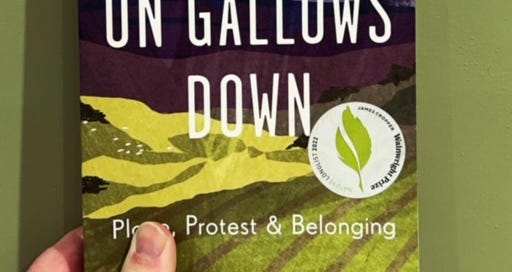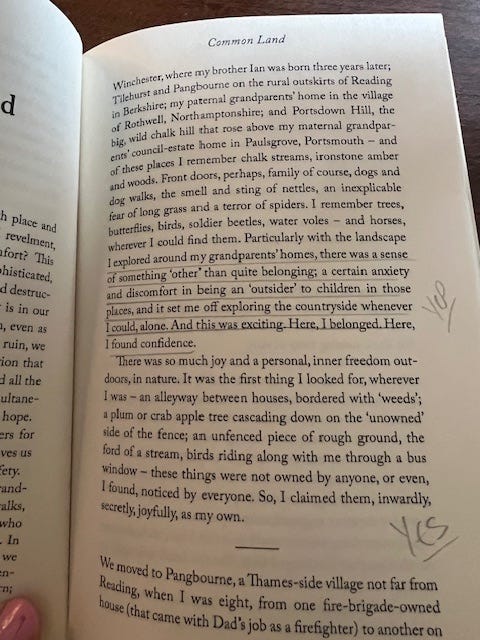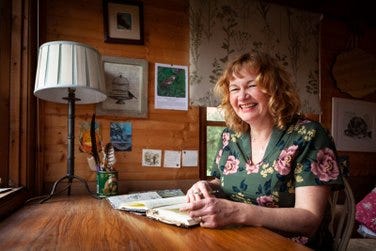"I didn’t set out to write a ‘memoir’ – or at least, I wanted to write a memoir of a place, I suppose – a kind of ‘love letter to’ … "
Notes from Nicola Chester on her Wainwright shortlisted memoir 'On Gallows Down'
Before we get to this fantastic interview with writer and nature activist Nicola Chester, I need to tell you about a few things: firstly, I currently have 10% off an annual subscription to my writing community Notes from the Margin. It needs to be redeemed by 30th April, so don’t hang about.
The other thing I need to tell you about is my upcoming zoom course Telling Your Story.
This course will run on Friday afternoons in May 2-3.30pm UK time. It’s all about telling your story through poetry and/or creative non fiction and we’ll be looking at craft aspects alongside discussing and analysing published extracts and as if that wasn’t enough, there will be writing prompts to help you get down to writing your story. The course is five weeks, the first four weeks are workshop weeks and the final, fifth week is a group feedback session.
This course is £50 and you can book through eventbrite, but it is FREE to paid subscribers of Notes from the Margin and I have 10% off an annual subscription until April 30th. That makes it £45 for a year of courses, workshops an community. Come join me!
Oh, and if you want to join me over on instagram I’ll be posting some snappy little respond and create prompts throughout April for NaPoWriMo
Now, to the interview. I have been a fan of Nicola Chester’s writing for a while. I’ve sen her columns in the Guardian Country Diary and have admired her own blog in which she gently examines and discusses the nature around her. She is a woman who is embedded in her landscape and the nature around her. When I read her Wainwright shortlisted memoir - On Gallows Down I found myself connecting to so much of what Nicola was saying about rural life, about the background rural, in fact, most of my note taking consisted of underlining passages and writing YES next to them.
I read the book slowly. I read a little every day, letting Nicola’s passion for protecting the environment, her local environment, the idea environment, run through me, thoughtful of my own experiences of interacting with my personal environment. It is a joy. A double joy, then, to be able to bring this book to my Books from the Margin book club and share and discuss with others. Nicola very kindly agreed to answer our questions, in typically thoughtful and fascinating manner.
From Nicola, who is too kind:
Before I get stuck in, can I just say a HUGE and heartfelt thank you to Wendy for recommending and including On Gallows Down, and to you all for reading it. It really is the very best thing and I am singing! These are great questions too, that have really made me think. You are all wonderful, Thank you x.
1. Were there any parts of the book that felt too personal, that you worried about exposing to the world?
Oh goodness, yes! I thought about family reading it, people in my small, close-knit community and friends; but particularly trying to describe the conservation partnership and friendship with the gamekeeper, whilst considering his family and mine. It was such an intense relationship; fun and on the right side of passionate (as we both were about the wildlife) we were, between us, partly responsible for bringing back some of the wildlife and protecting it, and spreading the word. But at times, the relationship/ venture felt close to being all-consuming. In the light of what-he-did-next (which was not my story to tell and I only hint at) I wanted to be very careful. He was so well known in the community, and it was important to be loyal and sensitive to his family. I took lots out that wasn’t relevant, rewrote parts – and deliberately didn’t name him. I worried most about his (now ex) wife reading it. She bought herself a copy on the day it came out and read it in one go – and it was ok. She loved it and was moved by it – and didn’t hold me to account for anything. I’ve never felt such relief.
2. How long did On Gallows Down take to write?
Ridiculously, 8 years! I picked it up and put it down, other things got in the way, I brought up my three children … but it was always there, in the background, the foreground, needing to be said.
3. You have occasionally been critical of the land management style of some of the places where you have lived in tied accommodation. Has that ever been uncomfortable for you?
Yes, extremely. And still! I never wish to demonise farmers/ landowners that don’t or aren’t able to farm or manage land with nature for a variety of reasons. It is and should be an issue that includes and involves policy makers, leaders, buyers and consumers and the public as much, if not more than farmers. And yet, so much of what I saw and still see going on could include nature and protect it easily and with little or no financial loss or outlay (even saving money in many cases) and it just doesn’t happen. Things urgently need to change. We often feel powerless, and yet sometimes, one person can make a huge difference – in a positive or negative way. But sticking my neck out often, still, and speaking out in my book, articles, my local paper column on social media gets me into hot water! I don’t like confrontation at all – but these are deeply troubled times. I always try to speak with consideration, but sometimes, I am grief struck, frustrated and angry! But the fact of the matter is, the landowners (lovely that they are) own our home, and I come dangerously close to risking that. I had a conservation with my husband and the family about this before I signed the publishing contract. Much of the local rural community’s politics (including my landlords) are largely opposite to mine, from wildlife knowledge and conservation, rural housing, game shooting, access to nature and the Right to Roam. But there is always common ground too.
4. As a woman nature writer do you ever feel you are placed into a particular category?
Ooh, interesting one. I didn’t set out to write a ‘memoir’ – or at least, I wanted to write a memoir of a place, I suppose – a kind of ‘love letter to’ … and found myself in it, emotionally as much as physically. I think now it is the memoir my agent and publisher said it was (I just couldn’t see it) though I do wonder if women writing about nature are more categorised as nature-memoir writers, when that is often just a lens for so very much more. But the book is also very much a female text. It comes from home and protecting that home – from raising family and being wild in a female sense; in the way of not owning things (even sometimes, a point of view, a politics) of having to be wary, stealthy, alert. It doesn’t have agency as such – or it does, but the agency comes from writing and defending something using, I think, feminine wiles, storytelling and connection; a certain fierceness that doesn’t come from the security and protection of owning anything, nor does it come from being free to make a stand without risk. I think it is still unusual for a woman to write politically and about protest and from a fairly working class (rural) background and standpoint.
5. Where do you most feel at home?
Outdoors and walking! On the hill or along one of the chalk tracks, or even somewhere unknown, with the wind in my hair, maybe my dog (between dogs at the moment) and no time restrictions. I just love to wander, on my own where I can meander, stop, look, rejoice, notice things whenever I want to and just be.
6. What is your writing routine?
Well now … I don’t have one as such! I juggle a lot (as so many people do – a near full-time job as a secondary school librarian, family, community stuff, animals) so it has always taken a back seat. Always the last thing on the list. But it is work (and it really is, it’s shouting out to be a full-time job and at some point, a decision is going to have to be made!) So I write in the gaps of life, sometimes in short bursts, in café’s waiting to pick a daughter up from work, or while she has detention (school = round peg, square hole!) but also into the evenings, when suddenly, the house quietens and I’m rejuvenated. I do get good spells – a day once a week, sometimes, weekends. But so much of my writing is done on the hoof. The thinking-dreaming-planning, working through knotty problems, sudden inspiration, often comes when I’m doing other things – walking the dog, driving to school, in the shower, loading the dishwasher, reading a poem or book – so there are scribbled notes and phone ramblings everywhere. So my routine? Writing is in everything I do, always, at any time. I never stop thinking about it!
7. What do you hope your children have taken from your experiences?
They’re now 22, 19 and 16 – and are all three great champions for the underdog, for all sorts of causes. They are very politically – small ‘p’ – morally and emotionally aware of injustice in the world and I’m very proud of them for that. They’ve all been on protests of one sort or another. Nature and that rural life runs right through them and though the older two (and younger one wants to) live in towns for Uni and love that culture and important expansion of their world, they seek out time in nature, where they feel ‘home.’ The rural, more working class life has given them lots of stories, and is a privilege in so many ways, but has undeniably disadvantaged them a bit, too. Not in any great way, but there are things they’ve not grown up with, have or had that their peers take for granted. And an insecurity around housing prevails – we still rent the same place, our house is small, in disrepair and it’s almost impossible for us to act as guarantors for them renting. Even though financially we can manage to support them, estate agents demand guarantors own their own home and earn more than we do. It’s an impossible situation and makes them very angry! But what I hope they’ve taken from my experiences really is a way to belong, through nature and local community action, wherever they go and whatever they do.
8. What has been the highlight of your writing career?
I’m just amazed, in this hard, hard world of getting a book published, that it was, that it’s out there. The highlights come from people telling me they’ve read it, loved it, took something from it – that it resonated. The lovely reviews it’s had. That’s such an astonishing thing. To be able to call myself a ‘writer and author’ is something I’ve always wanted. I’m massively proud to be a Guardian Country Diarist (again, lifelong dream) and to be a Countryfile Columnist, able to bring some of the issues and joys of country life to the nature table, as it were. But winning the Richard Jefferies Prize was immense – and runner up for the Wainwright too. Golden, breathless.
9. What do you feel is the biggest threat to nature and/or rural life?
To nature? That most people aren’t connected/ aware of what it is and don’t get its relevance and importance. Not just the joy and intricacy of it all, but that we are part of nature and it literally keeps us alive. I hear and see this in school all the time, from students and parents, including those that work with the land (as well as those that know and care deeply.) But it’s not their fault! Policy, land ownership, cultural and social history, poverty and many other things all feed into the lack of access to nature, the lack of inclusion of it as part of our lives, our community. So many people don’t know their wild neighbours – so how can they care? I’m one of the authors in a new book Wild Service, out on 25th April, edited by Nick Hayes, Jon Moses and the Right to Roam team – all about the ethos behind the history of access, and a quest for responsible, codified, inclusive access to nature and the wider countryside. I’m really hoping it will begin to change things. We need everyone and more people around that nature table! Nature needs to be first and foremost in every decision we make, as much as possible.
And rural life? The leaching of a diverse community – housing and rural public transport. We are fast becoming a green ghetto of wealth – of huge part-time homes, short lets and AirBnBs, where children are driven out of the village for school and activities, and the local provision can’t improve and isn’t supported. The elderly that have lived here all their lives and contributed to a vibrant community, are isolated and cut off. I could (and have) write reams on this! See Countryfile’s March issue!
10. What part of the publishing process were you not expecting?
I’ve been very lucky in having a great indie publisher (Chelsea Green) and their fantastic team. They’ve been very nurturing and supportive and I know now this is a rare thing! But what’s surprised me is how they are really up against it, with big publisher might, and big seller might. The year I was shortlisted and then highly commended for the Wainwright, I hoped the book would be more widely visible – in other indie bookshops of course, but also in Waterstones in small piles perhaps, as I’d seen in other years, or more reviews/ sales on Amazon – and genuinely, not for myself (we and they know indies are the best) but for them, as a reward of the risk they took in signing me and investment they made. But a combination of that summer’s Waterstones ordering service going down for months and the ability for larger publishers to cope with this and get round it and send piles of books regardless (and smaller publishers not) meant it didn’t get the exposure it normally would have done. So often, my book was ‘missing’ where others were there in quantity and flying out. Indie publishers can’t absorb costs like that, or offer unique covers or print extra chapters, or offer half price books so that big companies will promote. But I know where I’d rather be.
Thanks for reading! It really does mean the world.
Nicola has been writing professionally for 20+ years, after winning BBC Wildlife Magazine‘s Nature Writer of the Year Award. She is the RSPB‘s first and longest-running female columnist as well as writing a column for Countryfile Magazine and is a Guardian Country Diarist. Between 2003 & 2023, she wrote a weekly, then fortnightly column for the the Award Winning Newbury Weekly News, exploring her local wildlife and our relationship with it (here for more: https://www.holdthefrontpage.co.uk/2024/news/axed-columnist-laments-slow-decline-of-local-newspapers/ and the article itself – because ‘axed’ is a heavy-handed term I don’t recognise in this instance https://www.countryfile.com/people/opinion/decline-of-local-newspapers
She is the author of the Award Winning Memoir On Gallows Down; Place, Protest and Belonging (Chelsea Green, 2021) and RSPB Spotlight: Otters (Bloomsbury 2014) which was the first in an exciting, new series on iconic British Wildlife. Nicola’s writing also features in all four Seasons books, (Elliott and Thompson for The Wildlife Trusts, edited by Melissa Harrison) Red Sixty-Seven, (BTO) and Women On Nature (Unbound, edited by Katharine Norbury) The Bedside Guardian, 2022 and will feature in the upcoming Wild Service Anthology, ed., by Nick Hayes.
Nicola has also written for BBC Wildlife Magazine, Caught By The River, The Clearing, Country Living, The Telegraph, The Financial Times,Slightly Foxed and The Wildlife Trusts, among others. She wrote for many years for the RSPB’s Junior and Youth Magazines, inspiring many of today’s young wildlife campaigners.
Nicola writes to bear witness and to engage, move and reconnect people with nature in the hope they will then care enough to help stem its catastrophic loss. She is also a Secondary School Librarian, and never misses a chance to campaign for nature.








Wonderful to hear again from Nicola Chester, I’m a big fan. My two sons, now very grown up, used to read her stuff in the RSPB junior magazine long ago. I follow her in Guardian articles and of course I remember our interesting discussion on Books from the Margin and our questions. Love that book. Now I can soak in those great answers. Thank you Nicola.
I'm so glad to be introduced to your newsletter. Hello from Georgia in the USA!